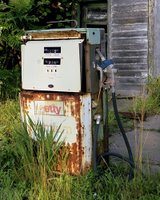Hydrogen and Alternative Fuels

I woke up this morning and saw an intriguing article on energy and alternative fuels from consumer reports. Essentially, it contrasted conventional diesel, ethanol (E85) fuel, biodiesel fuel, and hydrogen/electric power to standard gasoline and their cost/benefits of each.
Of course, it will still be a while before the US on the whole makes a switch to anything other than gasoline, but fortunately, alternative fuels are in the works.
Though the goals of ultimate, 100% sustainability might differ from more practical goals of cost-effectiveness and widespread production/distribution and availability, most of the alternatives mentioned in the list are better off than fossil fuels, which are non-renewable, pollutant, limited in production and supply, and therefore as of right now, quite costly both to the consumer and the environment.
 From the sustainability point of view, a hydrogen fuel substitute would be the ideal fuel alternative at this point in time. This, of course, is not to preclude the mention of other, yet un-tested alternatives, but rather evaluate the present options available. Little or no emissions make it a clean fuel, and it, as the article says, is the most abundant thing in the universe.
From the sustainability point of view, a hydrogen fuel substitute would be the ideal fuel alternative at this point in time. This, of course, is not to preclude the mention of other, yet un-tested alternatives, but rather evaluate the present options available. Little or no emissions make it a clean fuel, and it, as the article says, is the most abundant thing in the universe. Unfortunately, as wikipedia states, there are a number of problems with hydrogen, such as production, transportation, storage, distribution and end use. Consumer reports puts it this way:
...More pressing is the problem of where to get the hydrogen and how to get it to the vehicle. While hydrogen is abundant, it's almost always bound up in minerals, hydrocarbons, or water. The cheapest way to obtain hydrogen gas is by extracting it from natural gas. But if one of the goals of moving to hydrogen cars is to get away from fossil fuels, then taking hydrogen from natural gas is self-defeating.
An alternative is taking electricity from a nonpolluting source like solar, wind, or hydro power and using it to split water into its hydrogen and oxygen components. The problem here is that it takes more electricity to make the hydrogen than the hydrogen can generate in a fuel cell.
While I don't profess to be on the leading edge of science or fuel technologies in terms of chemistry and physics, it is my guess that, if possible, the company/group of people who discover a new non-volatile technology to overcome the present limitations of using hydrogen fuel would find major financial gain as a result.
But as I mentioned earlier, why limit ourselves just to hydrogen as the "ultimate solution"? While it does seem practical and abundant, is there not possibly another even more effective energy/fuel source for mobile vehicles? Of course, in a world (and universe) still more or less constrained by the law of entropy, nothing comes free, but certainly, this shouldn't (and likely won't) be an excuse not to continually look for/evaluate alternative fuel options.
While a low-to-zero cost energy alternative may seem like wishful thinking, remember too how odd the idea of "the internet" might have sounded to people 100, 500, or a thousand years ago. Ultimately, through constant design and innovation, fueled by the ideals of discovery, invention, and profit, we may one day discover a perfectly renewable, non-polluting, and cost-effective fuel source.
Categories: Fuels, Hydrogen
Pictures used with respect to Creative Commons license.

0 Comments:
Post a Comment
<< Home